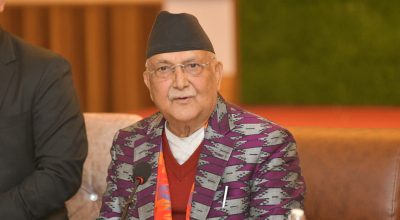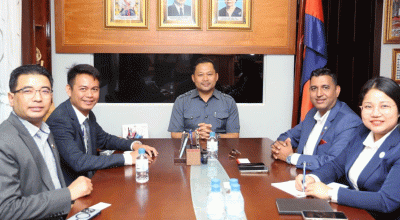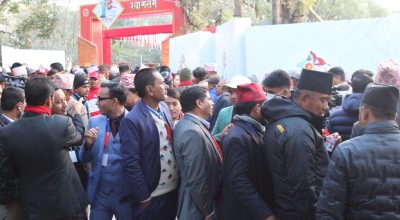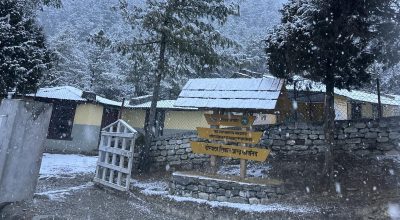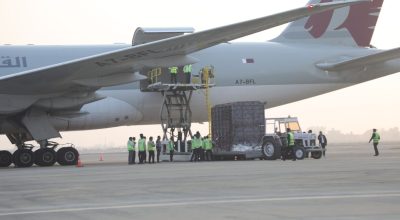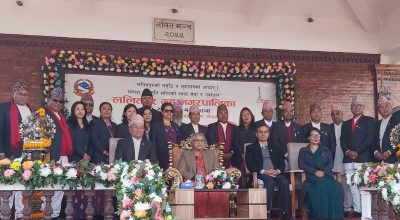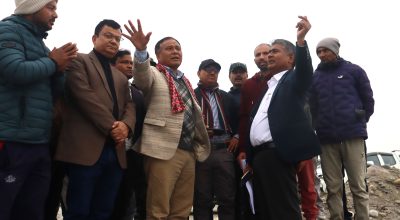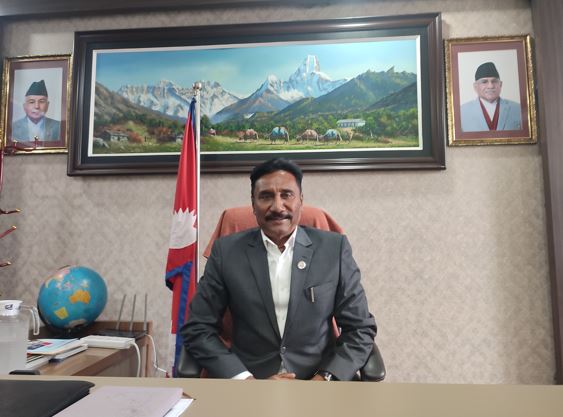
Minister for Labour, Employment and Social Security Sharat Singh Bhandari is identified as an adept politician who has successfully fulfilled the responsibility as a lawmaker and Minister holding various portfolios since long.
The senior leader of the Loktantrik Samajbadi Party is elected from the Mahottari electoral constituency -2 in the House of Representatives.
The Constitution of Nepal has enshrined the labour right as the fundamental right and in this context it becomes the government’s main responsibility to channelize the workers’ knowledge, skills and energy to the country’s development and prosperity by creating sufficient employment opportunities within the country itself.
The government has also emphasized on making the foreign employment which is a key employment sector for hundreds of thousands of Nepali youths safe, systematic and dignified until enough jobs are created within the country. At the same time the government, through its various policies, aims to ensure the rights, facilities and good labour relations of the Nepali migrant workers on foreign employment.
Today is the International Workers Day or May Day. RSS Feature News Section Chief Krishna Adhikari and Reporter Ashok Ghimire talked with Minister Bhandari in this context. Here are the excerpts of the interview:
Q. It has been a month since you assumed the responsibility of the Ministry of Labour, Employment and Social Security. What are the Ministry’s priorities?
A. The Constitution has focused on three areas in relation to the labour provisions – dignity of labour, safe labour and protection of right to employment. We have paid attention to moving ahead these three areas and to develop policies adopting secure and dignified labour in the national and international labour market by taking these three areas together.
Foreign employment has made a huge contribution especially to Nepal’s economic activities. Remittances sent by Nepali migrant workers working abroad have propped up the national economy and prosperity. This sector has to be made more systematized and dignified. It’s not only the question of only earning money through foreign employment. Important thing is to increase capital flow in the country through transfer of skills, knowledge and technology earned from this and channeling it for the country’s development to achieve economic prosperity.
The experiences from foreign employment and successful practices should be brought here and invested for Nepal’s overall development. A lot can be done in the agriculture, tourism and technology among the different sectors by bringing those skills, knowledge and experience.
Q. What has the Ministry been doing to make the foreign employment sector systematic and dignified?
A. Various negative things have been coming up in the foreign employment sector. There are negative practices also and these have to be resolved. We have held discussions on this matter with the stakeholders. We have started works as to how the anomalies and unethical practices in this sector can be removed. We have brought various programmes for making the foreign employment safe, dignified and systematized. Employment has to be explored and identified in the national and international sectors and the workers invested with appropriate skills and technology to match with the labour market. In this context the reintegration of foreign employment returnees in society is also important. We have also devised policy as to how these human resources could be made self-employed and utilize this manpower for the overall development of the country. We can create employment opportunities partnering with the private sector.
Q. Where has the concept of decentralization and localization of labour related services reached?
A. We’ve been trying to reach to the 753 local levels through the Prime Minister Employment Programme by using the technology. There is the Employment Service Centre at the local level as the focal point of the Ministry. We have made arrangements the Employment Coordination in every local unit will be able to carry out all types of works in an integrated way through the Centre. We have started work on how information on the opportunities for national and international employment can be reached to the local levels, how to reach the labourers and how they can be linked to the employment market through the employers concerned.Works are being carried out so that applications can be forwarded for labour permit and its renewal through the Service Centre. The government’s priority is to provide through the Service Centre whatever services are provided from the Ministry.
Q. How is the subject of reintegration of foreign employment returnee workers moving ahead?
A. We have formed various task forces for policy reforms in programmes ensuring works like managing even the capital for those workers going for abroad employment and taking them to the safe places. This will create conditions in which the workers would be free from middlemen and cheats. The Ministry has made preparation for providing the skills and economic sources through the one-door policy. We have also moved ahead works on reintegration of the foreign employment returnee workers utilizing the capital they have brought with them in nation building.
Q. You have floated the idea of branding workers, please could further make it clear?
A. Branding of Nepali workers is needed in the national and international labour market as per the need of time. Nepali’s unique culture, customs and identity are globally popular. We have proposed the branding of Nepali workers in a way that it would contribute to retaining and promoting their dignity and prestige in the international market. Basically, Nepalis are known as highly dedicated, honest, and courageous personalities in the international forum. In view of security aspects, Nepalis are reliable contributors. Such global recognitions should be developed as a brand of Nepali workers with the skills enhancement.
In addition to this, the hospitality is the essence of Nepali culture. Our nature and culture is service-oriented. There is a demand for Nepali nurses for different sectors in the global forum. Caring and compassion are the characteristics of the Nepali culture. “If could secure a descend jobs for Nepali nurses abroad, it would be of their dignity with economic opportunities.”
We have demands for seasonal workers from the global labour market. The opportunity for seasonal works will provide a room for learning technology abroad. Mechanization in Nepali agricultural system is still awaited and workers going for seasonal jobs could get such technology and apply the skills back to home. Our efforts will be addressing all these issues by policies. Technology handover and capital flow are necessary to strengthen production.
Q. A section of Nepali citizens are living illegally in several parts of the world and is there any efforts from the government to provide them a legal status in respective countries?
A. The Ministry of Labour is in touch with the Ministry of Home Affairs to provide a legal status to Nepali workers abroad acquiring labor permit or not. The section of workers with a labour permit has been undocumented with the term expiry while some have gone illegally. Our efforts will be for granting them a legal status once through a diplomatic way. The legal status provides them for doing jobs openly. After being a legal in the respective nation, anyone can return home legally.
Abroad job agencies are facilitating aspiring workers to reach the labour destination. They are searching for jobs for Nepalis in the international market and have roles in addressing the unemployment problem at home. But still some improvements are required to make foreign employment more descent, disciplined and secured.
The government is not for doing business, its role is facilitation and regulations. If any wrong practices, it should promptly intervene. Its role is for formulating laws and implementing them effectively. So, the government seeks to achieve descend, systematic and safe employment opportunities as its goals.
Q. What are plans to produce skilled workforces that are capable to compete in the international market?
A. Unskilled workers should not enter the national and international market. Workers should get training for skills in time of the advanced technology. We are at work to connect school education with labour through the coordination with the Ministry of Education. Training for skills and generating employment should be provided. We have a plan to manage policies on the matter. A curriculum should be created that includes skilled jobs like plumber, electrical and mechanical. Efficacy of the Vocational Skill Development Academy under the Ministry of Education will be enhanced, and be developed as an umbrella organisation. Similarly, it will provide international standard skills training by making international standards training guidelines. Training providers from the private sector should get an affiliation from the Academy, and its accreditation will be valid at the international level as well.
Credibility of training provided by various governmental and non-governmental organisations is being questioned. We will do work to impart training through a one-door system through the Academy.
Q. Lately, there is an increasing number of workers being associated with the social security fund. How is the role of the government in expanding the scheme to each worker?
A. We will increase the scope of the social security fund. Worker’s association with the fund is increasing day by day. Workers in the formal sector and migrant workers are getting affiliated with the fund. Now, the government has a plan to incorporate the workers in the informal sector and at self-employment. We have got a policy of attracting workers by increasing facilities contributors are entitled to. Now, migrant workers are getting attracted to be covered by the scheme. The constitution has granted the right to employment to each citizen. The government has brought various programmes relating to jobs so as to ensure people’s right to employment. People have got minimum job opportunities through the Prime Minister Employment Programme.
Q. A large chunk of remittances is being spent on consumption. What are plans to divert it to the productive sector?
A. Now, we have made it mandatory for migrant workers to associate with the social security fund. From this, workers get benefits immediately. As the fund get swollen, the government will lead the process to identify start mega projects with the workers’ contribution as seed capital.
As of now, remittances are being spent on consumption. They are being spent on fulfilling basic needs of people, and only then in the productive sector, it has been found. The government identifying and starting mega projects can save workers’ investments and create a climate conducive for investment by ensuring returns on them.
Q. What are the ways the government has adopted to search for new labour destinations?
A. The entire world is being developed as a global village. Opportunities have reached all places, and people have reached out there to grab them. We should not impose a prohibition on Nepali people to enter the market. The government has banned Nepali people to reach some countries for job opportunities. As a result, some people have reached the countries in search of jobs through illegal ways, thus incurring property and human losses in some cases. They have been in difficulties as a result, and the government has lost a huge amounts in taxes.
We are moving ahead with the policy of open labour market. We are moving ahead with the process to open all the countries with potentialities for job opportunities with which we have established diplomatic relations. (RSS)





